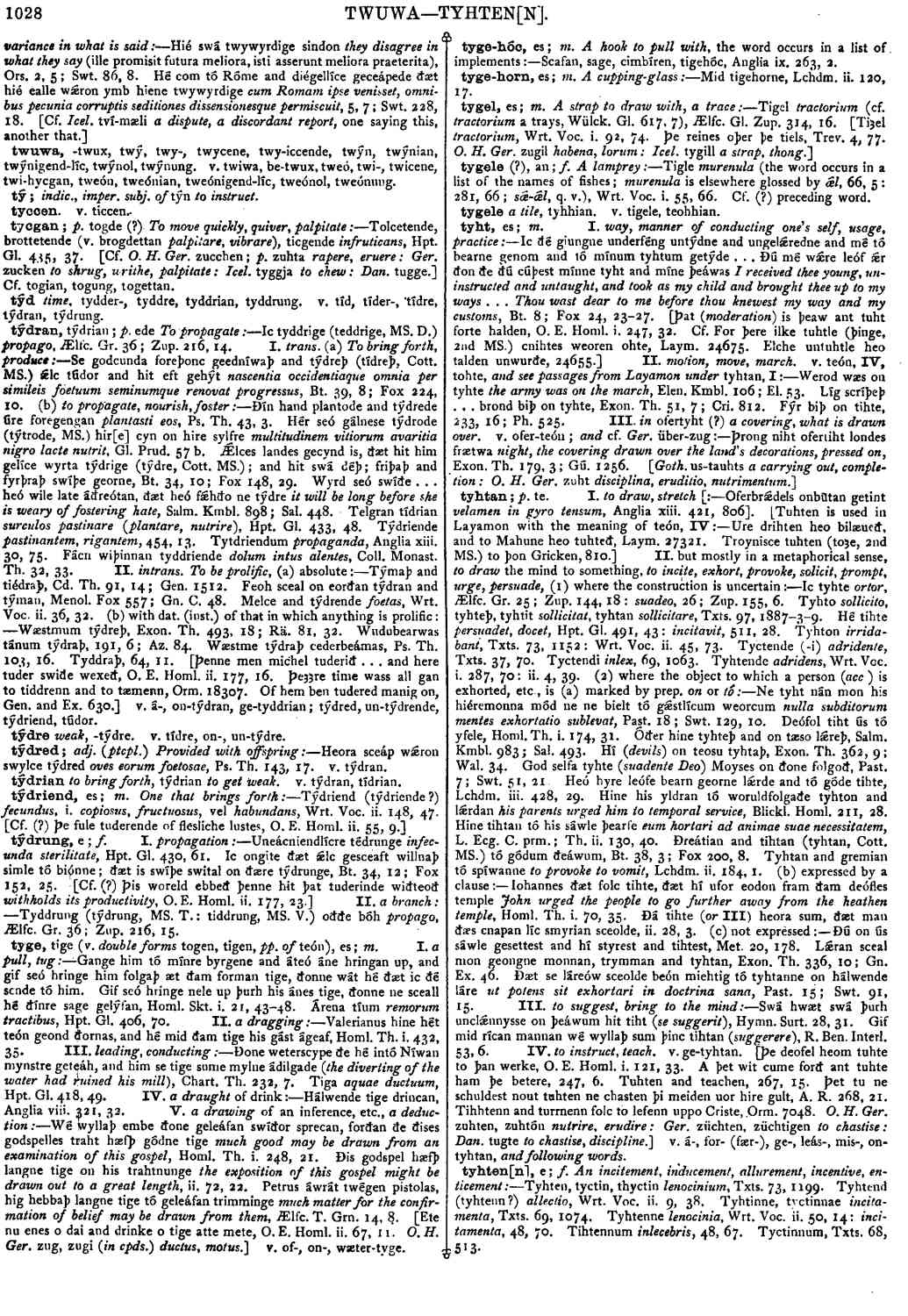tyhtan
- verb [ weak ]
-
Oferbrǽdels onbútan getint
velamen in gyro tensum,
Anglia xiii. 421, 806]. [Tuhten is used in Layamon with the meaning of teón, IV :-- Ure drihten heo bilæueð, and to Mahune heo tuhteð, Laym. 27321. - Troynisce tuhten (toȝe, 2nd MS.) to þon Gricken, 810.]
-
Ic tyhte ortor, Ælfc. Gr. 25; Zup. 144, 18:
suadeo,
- 26; Zup. 155, 6.
-
Tyhto sollicito, tyhteþ, tyhtit sollicitat, tyhtan
sollicitare,
- Txts. 97, 1887-3-9.
-
Hé tihte persuadet, docet, Hpt. Gl. 491, 43:
incitavit,
- 511, 28.
-
Tyhton
irridabant,
- Txts. 73, 1152: Wrt. Voc. ii. 45, 73.
-
Tyctende (-i)
adridente,
- Txts. 37, 70.
-
Tyctendi
inlex,
- 69, 1063.
-
Tyhtende
adridens,
- Wrt. Voc. i. 287, 70: ii. 4, 39.
-
Ne tyht nán mon his hiéremonna mód ne ne bielt tó gǽstlícum weorcum
nulla subditorum mentes exhortatio sublevat,
- Past. 18; Swt. 129, 10.
-
Deófol tiht ús tó yfele,
- Homl. Th. i. 174, 31.
-
Óðer hine tyhteþ and on tæso lǽreþ,
- Salm. Kmbl. 983; Sal. 493.
-
Hí (
devils
) on teosu tyhtaþ,- Exon.
Th. 362, 9; Wal. 34.
-
God selfa tyhte (
suadente Deo
) Moyses on ðone folgoð,- Past. 7; Swt. 51, 21.
-
Heó hyre leófe bearn georne lǽrde and tó góde tihte,
- Lchdm, iii. 428, 29.
-
Hine his yldran tó woruldfolgaðe tyhton and lǽrdan
his parents urged him to temporal service,
- Blickl. Homl. 211, 28.
-
Hine tihtan tó his sáwle þearfe
eum hortari ad animae suae necessitatem,
- L. Ecg. C. prm.; Th. ii. 130, 40.
-
Ðreátian and tihtan (tyhtan,
- Cott. MS.) tó gódum ðeáwum, Bt. 38, 3; Fox 200, 8.
-
Tyhtan and gremian tó spíwanne
to provoke to vomit,
- Lchdm. ii. 184, 1.
-
Iohannes ðæt folc tihte, ðæt hí ufor eodon fram ðam deófles temple
John urged the people to go further away from the heathen temple.
- Homl. Th. i. 70, 35.
- Ðá tihte (or III) heora sum, ðæt man ðæs cnapan líc smyrian sceolde, ii. 28, 3.
- Ðú on ús sáwle gesettest and hí styrest and tihtest. Met. 20, 178.
-
Lǽran sceal mon geongne monnan, trymman and tyhtan. Exon. Th. 336,
- 10; Gn. Ex. 46.
-
Ðæt se Iáreów sceolde beón miehtig tó tyhtanne on hálwende láre
ut potens sit exhortari in doctrina sana,
- Past. 15; Swt. 91, 15.
-
Swá hwæt swá þurh unclǽnnysse on þeáwum hit tiht (
se suggerit
),- Hymn. Surt. 28,
31.
-
Gif mid rícan mannan wé wyllaþ sum þinc tihtan (
suggerere
),- R. Ben. Interl. 53,
6.
Bosworth, Joseph. “tyhtan.” In An Anglo-Saxon Dictionary Online, edited by Thomas Northcote Toller, Christ Sean, and Ondřej Tichy. Prague: Faculty of Arts, Charles University, 2014. https://bosworthtoller.com/31382.
Checked: 0